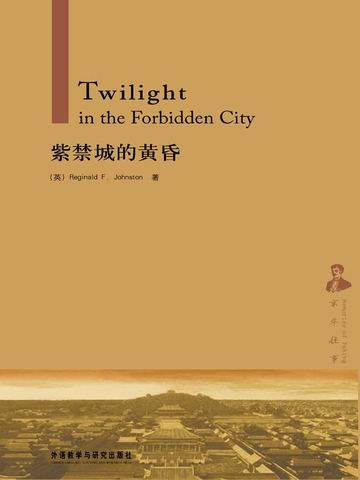帝师庄士敦对清朝两百多年统治的“黄昏时期”的再现。
Johnston provides a good deal of anecdotal material for the last days of the Qing court before the 1911 Revolution. He knew many of the active players in those events, and his observations on the Qing court's political structure, and in particular the Imperial Household Department, are of historical significance. Johnston had little to say about Empress Dowager Cixi and many other principal players in these events. Twilight in the Forbidden City is a history of an entire period and not an exclusive portrait of the last emperor of China. The film The Last Emperor features the book.
本书是一部个人的、怀旧的故事集,描述了从1919年到1924年的那些特殊岁月里,庄士敦在其人生顶峰时期与中国结下的不解之缘。其时,中国媒体针对庄士敦本人和溥仪有诸多的责难,而庄士敦所关心的,显然只是他对那些年里所发生事件的记述,可以对那些责难作出一劳永逸的反驳。为了回应对他和皇上的批评,庄士敦描绘了在紫禁城那个奇异、封闭的世界里独特而令人憧憬的生活图景。庄士敦谙熟中国历史与文化,于是,那个几近为人遗忘时代的丰富的历史细节,雪泥鸿爪般跃然于庄氏之笔端。加之,他与溥仪的密切关系,以及与那个时代许多大人物私人关系之熟稔,使得庄士敦得以对他们尽情褒贬点评。
本书的叙述略带忧伤,寄哀于现代世界中中国不断沉沦的命运。然而,尽管作者意识到中国文明的辉煌已成过去,但本书并非满篇哀鸣与幻灭之词。相反,庄士敦在书中表达了对中国和中国人民的诚挚情感。对于他所深深尊崇并得以亲历其中的中国文化与政治世界,庄士敦也聊表谢忱,著书如是。
Twilight in the Forbidden City (Chinese: 紫禁城的黄昏; pinyin: Zǐjìnchéng de Huánghūn) is Reginald Johnston's 486-page memoir of Henry Puyi, who had been the Xuantong Emperor of the Qing dynasty. Johnston was tutor to the Emperor and an eyewitness to events in China in the 1920s and 1930s. Johnston was also a professor of Chinese at the University of London as well as the British Commissioner of Weihaiwei.
- 总序
- 前言
- To HIS MAJESTY THE EMPEROR P'U-YI
- Preface by His Majesty the Emperor
- TRANSLATION OF PREFACE
- INTRODUCTION
- CHAPTER I The Reform Movement of 1898
- CHAPTER II The Collapse of the Reform Movement
- CHAPTER III Reaction and the Boxer Movement, 1898—1901
- CHAPTER IV The Last Years of Kuang-Hsü, 1901—1908
- CHAPTER V The Empress-Dowager T'zû-His
- CHAPTER VI The Revolution, 1911
- CHAPTER VII The "Articles of Favourable Treatment" of the Manchu Imperial House
- CHAPTER VIII The Ta Ch'ing and the Hung Hsien Emperors
- CHAPTER IX Chang Hsün and the Restoration of 1917
- CHAPTER X Autobiography of the Old Man of the Pine-tree (Translated from the Chinese)
- CHAPTER XI The Forbidden City, 1919—1924
- CHAPTER XII The Imperial Tutors
- CHAPTER XIII The Manchu Court in Twilight
- CHAPTER XIV The Imperial Household Department
- CHAPTER XV The Dragon Unfledged
- CHAPTER XVI Monarchist Hopes and Dreams
- CHAPTER XVII The Dragon Restless
- CHAPTER XVIII The Dragon Flaps His Wings
- CHAPTER XIX Dragon and Phoenix
- CHAPTER XX Plots and Stratagems
- CHAPTER XXI The Imperial Garden
- CHAPTER XXII The Summer Palace
- CHAPTER XXIII The Fifth of November
- CHAPTER XXIV The Dragon Caged
- Chapter XXV The Flight of the Dragon
- Epilogue: The Dragon Goes Home
- The Pedigree of the Manchu Emperors
- 版权页























 京公网安备 11010802032529号
京公网安备 11010802032529号
笔记加载中...